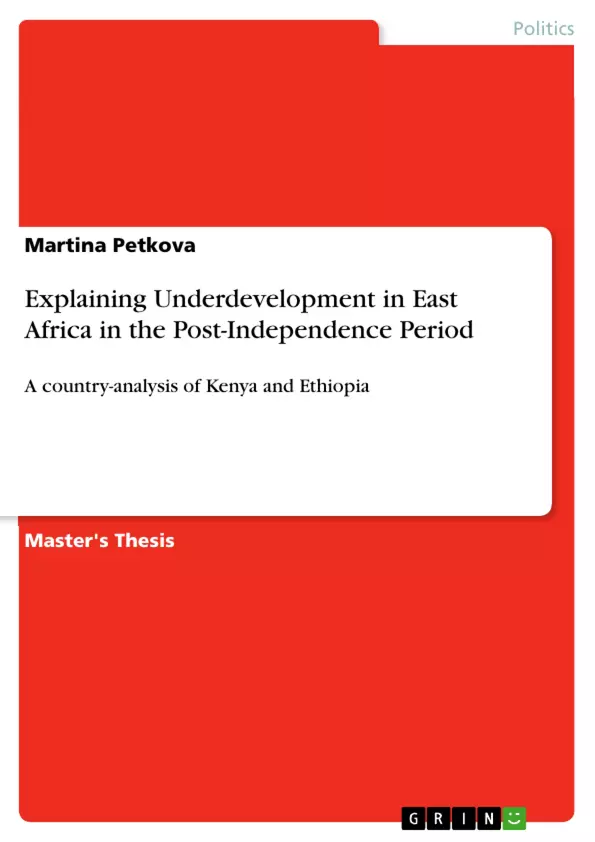This paper explores the connections and gaps between underdevelopment, the colonial legacy, imported foreign practices, regimes and emerging economies, in order to understand more clearly how typical, general discourses on development continue to carry ideologically charged and historically transposed meanings.
The term underdevelopment is primarily used to trace and define the retrogressive economic pattern within a given society and the corresponding postulates. Underdevelopment, however, illustrates also how the post-colonial fragility of the African economies becomes affected by internal conflicts, regional disputes, militarization and indoctrination of the masses. Beginning with a literature review and definitions of the concept, the paper seeks to investigate the multipolar problematics in Eastern Africa in the post-colonial period, with particular regard to the Federal Democratic Republic of Ethiopia and the Republic of Kenya.
These two studies aim to illustrate and contrast the contextual differences of the colonized and independent types of countries, together with their common internal and regional dynamism that cause underdevelopment to be ongoing. This paper then explores and analyzes the aforementioned states according to particular indicators and provides evidence, in which a deconstructive comparison is used to trace periodical, pre- and post-colonial realities and the state of affairs of the underperforming sectors. Moreover it will then shed light on the continuity of underdevelopment, within the context of the theorization of the given amalgam of critical factors that have been redefined over time. The thesis concludes with a summary and questions the notion of unequal development on the African continent.
Inhaltsverzeichnis (Table of Contents)
- Chapter 1: Introduction and Methodology
- 1.1 Introduction
- 1.2 Thesis objective
- 1.3 Methods and research
- Chapter 2: Framework: literature, concepts and definitions of underdevelopment
- 2.1 Literature review, scholars & ideology
- 2.2. Overview of underdevelopment: definitions and concepts.
- Chapter 3: Colonialist and post-colonialist's legacies in East Africa.
- 3.1 First symptoms of underdevelopment
- 3.2. Post-colonialism in East Africa : underdevelopment's intensification?
- 3.3 Legacy of foreign imported regimes & ideologies in East Africa.
- Chapter 4: Country profiles and analysis criteria for underdevelopment
- 4.1 East Africa: Kenya and Ethiopia
- 4.2 Indicators of underdevelopment
- Chapter 5: Conclusions
Zielsetzung und Themenschwerpunkte (Objectives and Key Themes)
The main goal of this paper is to explore the complex relationship between underdevelopment, the colonial legacy, imported foreign practices, regimes, and emerging economies in East Africa. By focusing on Kenya and Ethiopia, the paper aims to understand how general discourses on development continue to carry ideological and historical baggage. The paper challenges the notion of underdevelopment as solely an economic phenomenon and seeks to integrate political, social, and cultural factors into the analysis.
- The impact of colonial legacies on post-colonial development in East Africa.
- The role of imported ideologies and regimes in shaping economic and social structures.
- The interplay between internal conflicts, regional disputes, and underdevelopment.
- The contextual differences between countries with different colonial experiences.
- The persistence of underdevelopment despite economic growth in certain sectors.
Zusammenfassung der Kapitel (Chapter Summaries)
Chapter 1 introduces the topic of underdevelopment in the context of post-colonial African states, highlighting the ongoing debates about its causes and consequences. The chapter outlines the research methodology and the thesis objective, which focuses on exploring the relationship between underdevelopment, ideologies, and regimes in East Africa.
Chapter 2 provides a framework for understanding underdevelopment by reviewing relevant literature, concepts, and definitions. It examines various theories of development and underdevelopment, including Modernization and Dependency theories, and critically assesses their limitations and strengths.
Chapter 3 delves into the colonial and post-colonial legacies in East Africa, tracing the historical roots of underdevelopment. It explores the first symptoms of underdevelopment, the intensification of these issues in the post-colonial period, and the impact of imported regimes and ideologies on the region.
Chapter 4 presents country profiles and analysis criteria for underdevelopment, focusing on Kenya and Ethiopia. It examines specific indicators of underdevelopment and provides a comparative analysis of the two countries, highlighting their contrasting colonial experiences and current challenges.
Schlüsselwörter (Keywords)
The primary keywords and focus topics of this paper include: underdevelopment, post-colonialism, colonial legacies, East Africa, Kenya, Ethiopia, regimes, ideologies, development, economic growth, internal conflicts, regional disputes, comparative analysis, and historical analysis.
Frequently Asked Questions
What are the main causes of underdevelopment in East Africa?
The paper identifies colonial legacies, imported foreign regimes, internal conflicts, regional disputes, and militarization as key factors.
How do Kenya and Ethiopia differ in their colonial history?
The study contrasts Kenya, a formerly colonized state, with Ethiopia, which has a different independent history, to show how both still face similar developmental challenges.
What is the impact of imported foreign ideologies?
Foreign practices and regimes often carry ideologically charged meanings that may not fit local contexts, potentially intensifying underdevelopment.
Is underdevelopment solely an economic issue?
No, the research integrates political, social, and cultural factors, showing how post-colonial fragility affects the entire state structure.
What role does "unequal development" play on the continent?
The thesis questions the notion of unequal development and traces pre- and post-colonial realities to explain the state of underperforming sectors.
- Citar trabajo
- Martina Petkova (Autor), 2014, Explaining Underdevelopment in East Africa in the Post-Independence Period, Múnich, GRIN Verlag, https://www.grin.com/document/303876



